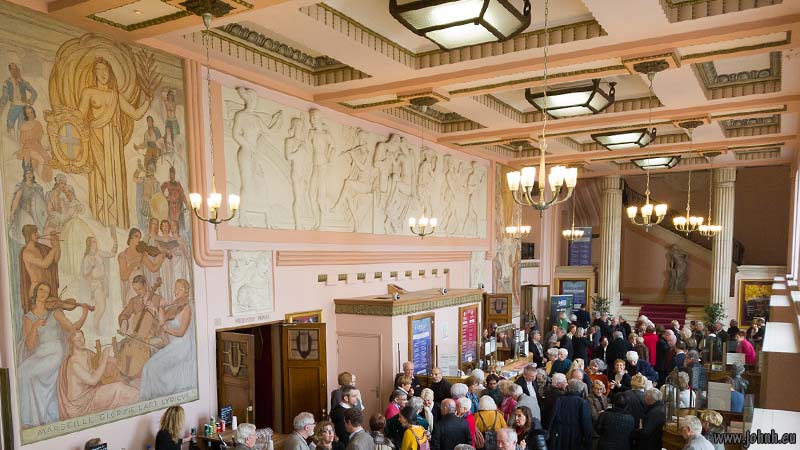Marseille Municipal Opera sounds like a paradox and it is: this was a very enjoyable performance with a memorable tenor in a new production of Massenet’s Hérodiade, a co-production with another French regional opera, St. Etienne. L’Opéra de Marseille has a long history dating from 1787. The art deco foyer and glorious marbled proscenium faced in pink marble with red veins are the result of reconstruction in the 1920s following a fire. The acoustics are good as a listener, quite clear. An old auditorium, high and wide rather than deep.
Lots of plush seating. It’s a very wide pit so you get a spread of width of sound rather than an integrated sound. The conductor (Victorien Vanoosten) was directing very precisely but I think that wasn’t because the players couldn’t hear each other.
There are surtitles but the toilets are from another age. The audience seemed to be both the high professional end of Marseille society and coach parties of mostly OAPS. My neighbours, both OAPS, had come in from Montpelier by coach. The lady the other side was a sprightly ninety, from the Belles-de-Mai district of Marseille. The smartest suits and haircuts are on the ushers.
Sort of a throwback to a production style of an earlier time: a steeply raked stage, lots of people on stage in period costumes, either standing around or making very slow meaningful moves. But the setting (Jean-Louis Pichon) is contemporary symbolic with horizontal wooden spikes facing threateningly in to the stage area and extending from the real ones in the slips to images on the video screen at the back of the stage. The front curtain - which comes down for scene changes in the old fashioned way - gives the idea of being the outside of the crate in to which the sharpened stakes are being driven. So the setting is the pressure cooker of an occupation, which leaves the music to tell us the emotions of the love and Mother/daughter stories.
First bars are of sonorous harp chords over strings but then some discordant phrases establish Jules Massenet’s score of Hérodiade is from the 1880s. But this score is not Tristan, Madame Butterfly or even Samson et Dalila. Hérodiade has four acts, one big tune, a thrilling sextet, opportunities particularly for the tenor, plus some ballet interludes. However, there’s a lot of spare in between which just tells the story of an occupied people; this would have had particular historical resonances at the time of the first production. It’s easy (with hindsight) to see this style of opera evolving to musicals on the stage or Busby Berkley spectaculars on film while Grand Opera evolved in the directions forged by Wagner and Puccini. But meanwhile here is Massenet’s Hérodiade of 1881 revived on stage in Marseille, still glorious although in the musical style pioneered fifty years earlier by Daniel Auber and complacently continued in the Belle Époque.
Victorien Vanoosten conducting was great, he held together and let breathe a long and varied score giving the soloists space to express but guiding the ensembles fluidly when required. Orchestra generally rather good so it is easy to forgive one or two rough bits in the extensive passages of accompaniment. A big chorus of about sixty, thrillingly coherent as they are singing in their own language, and able to sing convincingly of glory, victory and maybe even a malevolent curl of the lips towards the occupying Romans.
Jean (Florian Laconi) is a fine tenor whose voice filled the house and won extended applause. Glorious duets with Salomé (Inva Mula), she has the tone and suppleness though maybe not the power. The other soloists sang well and have promising CVs listed in the programme. The Roman soldiers were frankly pantomime when I don’t think they were meant to be, a strange omission in Marseille where there is no shortage of men looking super tough.
Lighting rig apparently tungsten but fairly sparse with just a warm and a cold wash and a few positions highlighted. Maybe the options are limited so as not to overwhelm the video or maybe there is a heat or power or channels limit. I didn’t notice any followspots.
And a pleasure to enjoy at the interval a little glass of champagne and a brioche on those steps outside the building, savouring the contrast of high culture inside the temple railings with the scene beyond: kids in skinny trackies by day but where the street girls will be trolling after dark around the red light bars.
Opera is always a treat and this was a special and very French treat. L’Opéra de Marseille is not something the city is generally famous for but it deserves to be.
=====================
Credits
Hérodiade de Jules Massenet
Opéra en 4 actes et 7 tableaux
Livret de Paul MILLIET et Henri GRÉMONT, inspiré du dernier des trois Contes de Gustave FLAUBERT, Hérodias
First performance at Bruxelles, Théâtre de la Monnaie, le 19 décembre 1881
Most recent performance at l’Opéra de Marseille, 18 décembre 1966
Nouvelle Production:
Coproduction Opéra de Marseille / Opéra de Saint-Étienne
Direction musicale - Victorien VANOOSTEN
Mise en scène - Jean-Louis PICHON
Décors et costumes - Jérôme BOURDIN
Lumières - Michel THEUIL
Chorégraphe - Laurence FANON
Vidéaste - Georges FLORES
Salomé - Inva MULA
Hérodiade - Béatrice URIA-MONZON
La Babylonienne - Bénédicte ROUSSENQ
Jean - Florian LACONI
Hérode - Jean-François LAPOINTE
Phanuel - Nicolas COURJAL
Vitellius - Jean-Marie DELPAS
Le Grand Prêtre - Antoine GARCIN
La Voix du Temple - Christophe BERRY
Orchestre et Chœur de l’Opéra de Marseille




